Is This Myth Preventing You From Getting Promoted?
By Assertive Way
Key Takeaways
- There is a myth that hard work speaks for itself. I hate to break it to you, but it doesn't. You need to make your work visible.
- You have to raise the perceived value so it matches the real value of your work. Do that by sharing why it matters, who it serves, the challenges, and the insights.
- If you feel like promoting your work is bragging, then try these: show your excitement, brag about others first, show the struggle to achieve it, be specific about what you do without giving yourself a pat on the back, and ask others about what they are working on so they ask you back.
- Self-promotion isn't always the way forward, it depends on how visible your work is and to whom, the company and country cultures, your leader's management style, if you have a sponsor, and how structured your career path is.
- Here are 5 ways to make your work be recognized: spend at least 10% of your time showing your work and building relationships, give your boss regular and well formulated updates, have more meeting presence, share achievement stories enthusiastically, and recognize others.
The Myth of “Work Hard Speaks For Itself”
Have you ever heard any of these sayings?
- “Hard work speaks for itself.”
- “Work hard in silence, let the success be your noise.”
- “Let your hustle speak louder than your mouth.”
Or perhaps as a child you’ve been told the fable about the happy hard-working ant and the miserable lazy grasshopper. Great story with an important message. But I haven’t seen any fable that teaches the importance of demonstrating or selling the value of your work to others.
For those of you in Finance, you want the extrinsic value of your work to at least match its intrinsic value. How do you do that ethically? By communicating its value.
Many of us have been taught that if we work hard, put your head down, stay focused, be productive, and put in more hours than others, we will be noticed, recognized, and get ahead in our career.
Have you ever noticed people in the same department who work less than you but still seem to get promotions faster? Why does that happen?
Here’s the reality most of us learn the hard way: hard work on its own doesn’t speak for itself, even if it’s great quality work.
If you wait for others to notice your hard work, you could be waiting for a very long time. Eventually, you’ll lose your motivation and you’ll be stuck, wasting your potential.

A successful partner at a law firm shared what she did as a young lawyer to have partners notice her work:
- “The decision makers didn’t see what I did. So, I put a memo together to show what I had done. Back then I had to come to the table prepared to advocate for myself- I explained why I was ready for the promotion and what my achievements had been. Now as a partner, I realize that few people are paying attention. I have no idea what people are doing because I don’t have the capacity for it. So, I ask them to write it out. On the other side is enlightening because you can’t keep those things top of mind.”
Luckily, she had a mentor that explained she had to sell herself as a young lawyer. Demonstrate your value too.
“Now as a partner, I realize that few people are paying attention. I have no idea what people are doing because I don’t have the capacity for it. So, I ask them to write it out.” – Partner in Law Firm

Translate Your Hard Work To High Value
Your goal is to increase real value and perceived value. High value can come with work that isn’t that hard for you. On the other hand hard work can lead to low real and perceived value.
Ask yourself how your boss and other people who have influence or decision-making power over your career would answer these questions:
- Do they perceive the work as high value?
- Do they know what you’ve achieved?
- Do they acknowledge the real effort required to achieve it?
- Do they have the numbers or insights related to that achievement?
- Do they know who is going to benefit from it?
- Do they know why the achievement matters?
For example, imagine you are a code developer and you create a code that reduces errors in one of the company systems. Imagine your boss doesn’t code. Do you think they will understand the complexity of debugging? Or making sure the whole program is annotated correctly so that others can use it later? Do they understand what the program is for and how it’s relevant? If you want your work to be acknowledged, you’ll need to explain it.
Your goal is to increase real value and perceived value. High value can come with work that isn’t that hard for you. On the other hand hard work can lead to low real and perceived value.
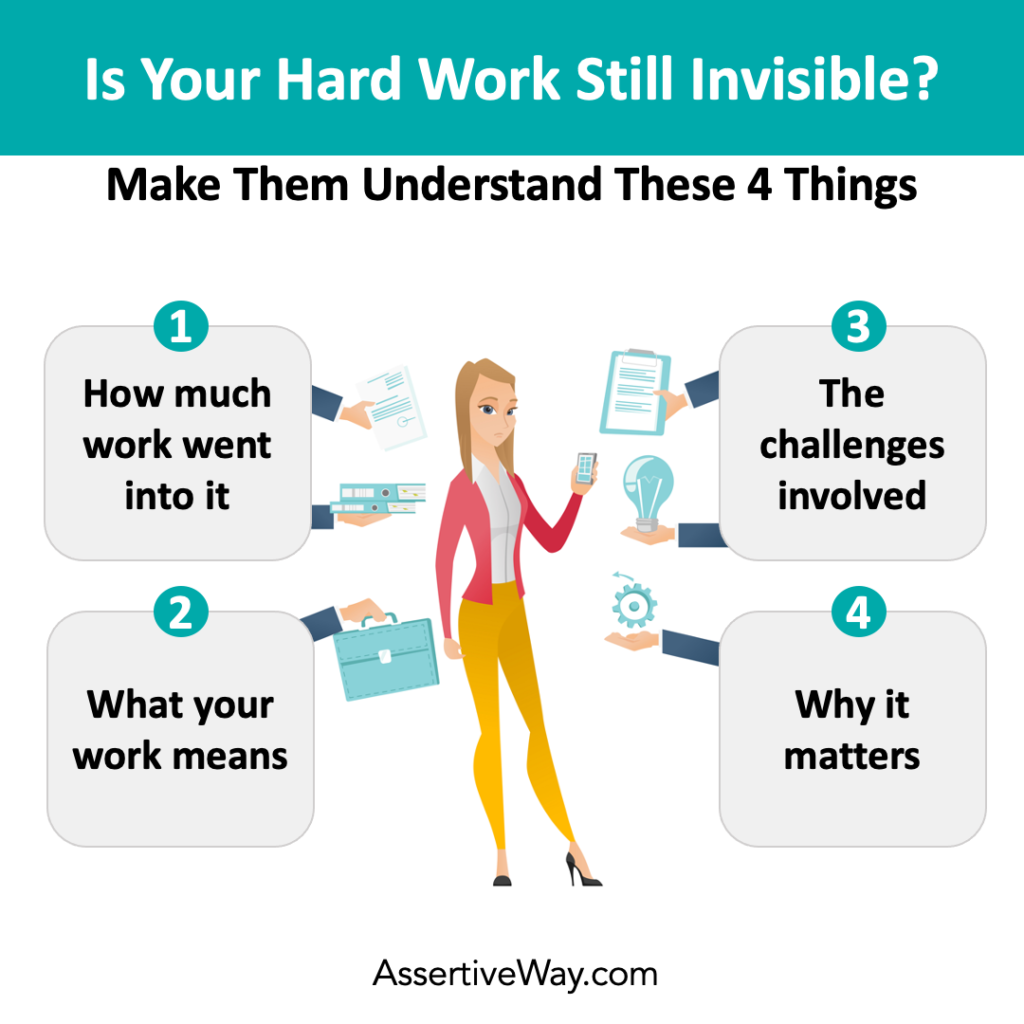
Is Self-Promotion Always Needed?
The need for self-promotion will depend on many factors:
- The type of work visibility
Some work is more visible than others. A project manager, salesperson, or team lead will be more visible even if they don’t promote their work because their jobs involve being out and about talking to people. However, a programmer or analyst may not get as much face time unless they actively pursue it.
- The country culture
Asian cultures tend to see self-promotion negatively while Western cultures see it as necessary for growth.
- The company culture
Some companies encourage self-promotion while others don’t. Highly competitive companies require a lot of self-promotion. More collaborative environments have a softer approach to it.
- Your boss’s management style
A manager that is highly involved in their employee’s work will notice hard work, but a manager that gives the employee more autonomy won’t, unless the employee shows the work.
- If you have a sponsor or not
If you have a company sponsor that knows your work and promotes you on your behalf, then you’re already in a great position and don’t need to promote yourself as much. If you don’t have any powerful person to speak on your behalf, you’ll need to do that work yourself.
- How structured your career path is
Some companies have highly structured programs, usually for younger talent, where a growth path is already set. Those programs give talent the opportunity to speak about their accomplishments and leadership follows them more closely. Therefore, their processes already embed self-promotion.
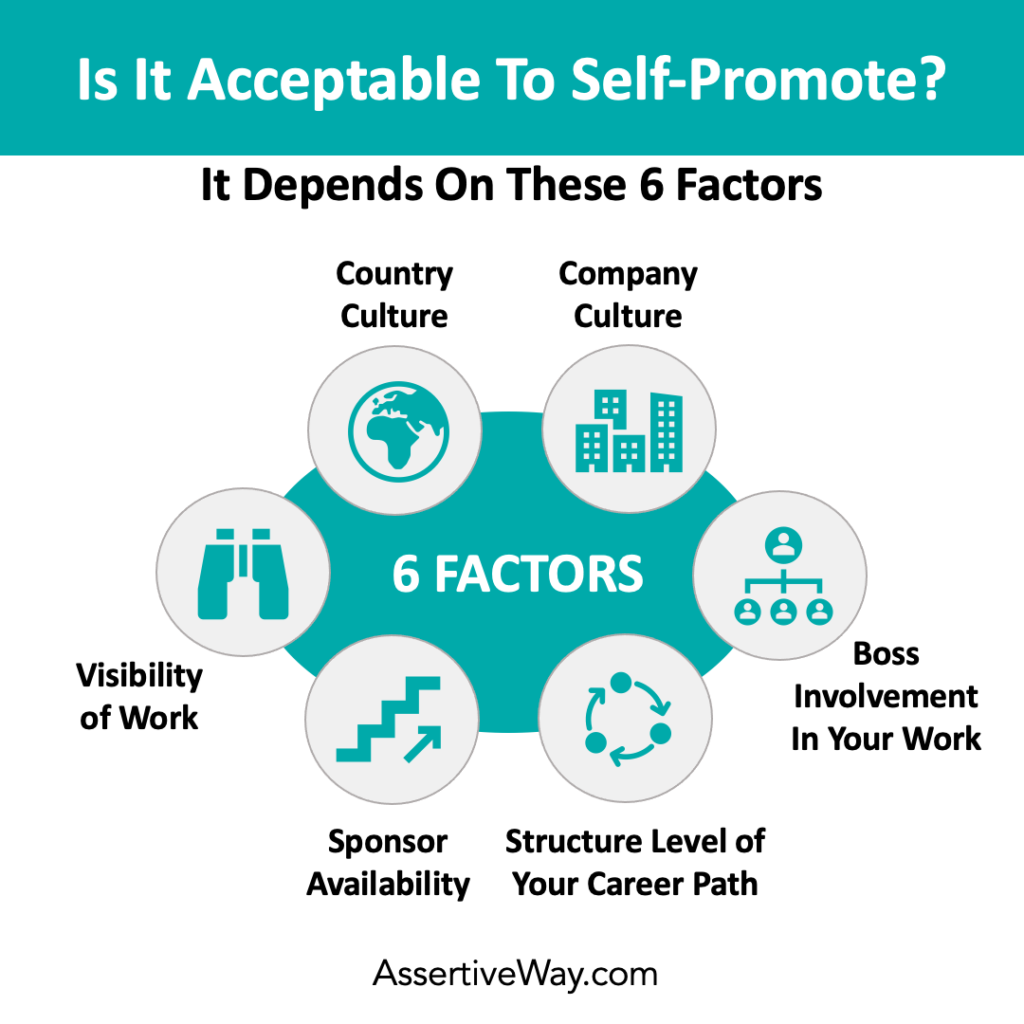
How To Be Recognized For Your Hard Work
Hard work is great if the right people know you worked hard and why it matters. You need to show your work. Consistently.
My boss once recognized me for working the longest hours in the department. But it didn’t get me a promotion. Then I started to network with other departments. I also scheduled a meeting with my boss’s boss and pitched an idea I had been working on. Within 3 months, I was promoted, got a team, and I was even allowed to name the team and define the role.
Hard work is great if the right people know you worked hard and why it matters. You need to show your work. Consistently.
Here are 5 things you can do that will advance your career and give you the recognition that you deserve for your hard work. Yes, you need hard work, but make sure you leave some of your best energy and time for these:
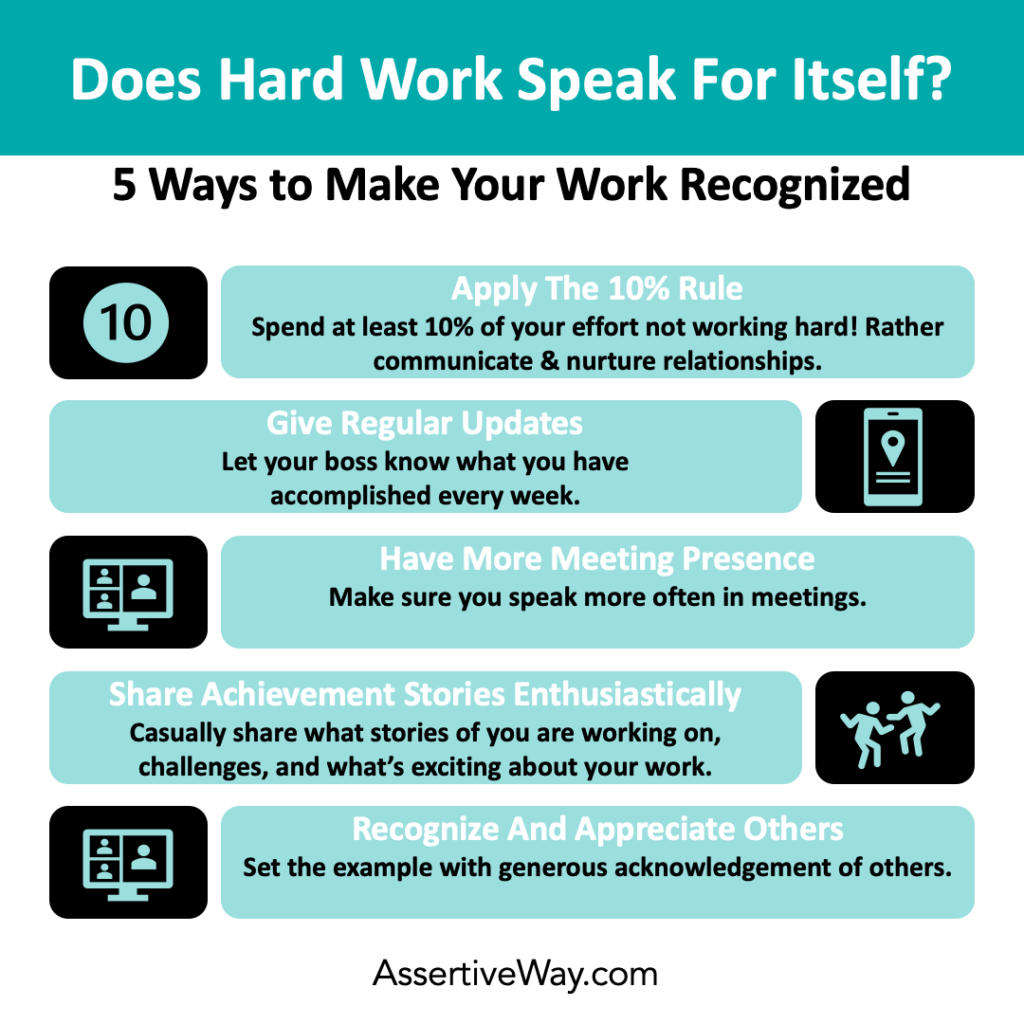
1 Apply the 10% Rule
Spend at least 10% of your effort communicating with others and building relationships.
I used to make the mistake of trying to work 100% of the time. It doesn’t work. Most companies operate departments in silos. No one knows what other people are working on, unless you show up. That’s why relationships and effective communication are the key to success in most jobs. Connect and find ways to add value to the people you know.
Even if others want to share your amazing work, you’ll need to give them the words, the numbers, the details so they can represent you and your work on your behalf. Just like lawyers need the details from their clients to argue their case on their behalf.
Allocate at a minimum 1 hour a day (which is about 10% of your time) to share your ideas, your contribution, and build relationships with other people. That could be through meetings, one on ones, email updates, presentations, or networking lunches.
Even if others want to share your amazing work, you’ll need to give them the words, the numbers, the details so they can represent you and your work on your behalf. Just like lawyers need the details from their clients to argue their case on their behalf.
2 Give Regular Updates
Update your boss on your work and achievements regularly.
Your boss will forget what you’ve done unless you remind him or her of it. Even exceptional work will be forgotten if you’re not reminding them. Don’t wait for the regular annual performance evaluation.
Your achievements are your boss’s achievements too. Promoting your work will help your boss. When you give your boss clearly articulated deliverables, you make their job easier. They can then promote the work to their boss and colleagues, and mention you.
I’ve had 2 bosses in my career ask me to provide specific updates and I really enjoyed it because it made my boss value my work. They loved it too.
Here’s what you can do: email your boss weekly with a bullet point list of your achievements for the week and your plan for the following week. Remember it’s not just about the number of bullet points. It’s how well you articulate the importance of that work.
Include what you delivered, who benefited from it, key insights, and what the benefit was. Add numbers if you can. This should be like bullet points on a CV. So instead of saying “Delivered a sales report” say “Delivered a sales drivers analysis to the revenue team that identified an opportunity of $1m in the food segment.”
You could also bring it up in regular catchup meetings. This is going to increase the perceived value of your work and help your performance evaluation when the times comes. This is not about bragging; it’s about communicating clearly and outlining specifics about your contribution.
You’re not saying “My work is so awesome”. Instead you are saying “I developed this product for this purpose.” It’s factual. It’s clear. You’re not evaluating yourself. Here’s another tip: speak with enthusiasm to not sound like you are self-promoting.
Your achievements are your boss’s achievements too. Promoting your work will help your boss.

3 Have More Meeting Presence
Speak up more often in meetings.
People will evaluate you and your competency not only on your deliverables, but on your presence, ideas, and interaction. That’s why you need to make yourself present whenever you have a chance.
Better yet, you need to create opportunities to be more visible and to make your work visible. If you’re working behind your desk all day long and don’t promote your work, it will either be invisible or someone else will promote it and get the credit for it, even if unintentionally because they are present and seen.
Face time is important. When you speak in bigger meetings, you get your message across to many people at once. If you are more comfortable in one on one meetings, that works too. Just make sure you speak up, offer your opinion, and if it is relevant, reference work you are doing.
Join meetings with the right people and create opportunities to speak in them by taking on specific roles.
If you find it difficult to find what to say in meetings or if you think you don’t have anything meaningful to share, check out my free guide on 15 ways you can participate more in meetings here.
4 Share Achievement Stories Enthusiastically
Stories are a very organic way of sharing information. Casually share what you are working on and your achievements in a story format, including struggles, meaning, and emotions.
People won’t know what you are working on until you say it. And it doesn’t have to feel like hard self-promotion. Make it a conversation. Talk about what you are working on, the challenges and what excites you. Talk about a project that you’ll start in the future. Or something that went well in the past.
To make speaking about your work flow naturally, start by asking them what they are working on. Then, they may return the question to you. You can do this at the start or end of meetings or calls, during lunch time, or even schedule catchup time for this type of exchange.
To make speaking about your work flow naturally, start by asking them what they are working on. Then, they may return the question to you.
5 Recognize And Appreciate Others
Set the example with generous acknowledgement of employees, colleagues, and even higher ups. Give others positive feedback, compliment them on their success in front of others, and help them get access to higher profile decision makers.
In other words, be the change you want to see in your company, as Gandhi would say. That way, you’ll indicate that you value and welcome that type of positive sharing.
Summary
In summary, if you want to get ahead at work and if others don’t know what you are working on, then you’ll need to show your work.
Try these strategies:
- Apply the 10% rule
- Give your boss regular updates
- Have more presence in meetings
- Share achievement stories enthusiastically
- Recognize and appreciate others
Remember to explain your work enthusiastically, show why it matters, and make it specific. That way it won’t be bragging. It will feel natural and will allow others to notice and value your work.
Let me know in the comments below if you agree that hard work isn’t enough, how you feel about self-promotion, and if you have any favorite strategies to not sound like you’re bragging.
“There’s no shame in helping others see your value.” – Unknown
Spread the assertive confidence!
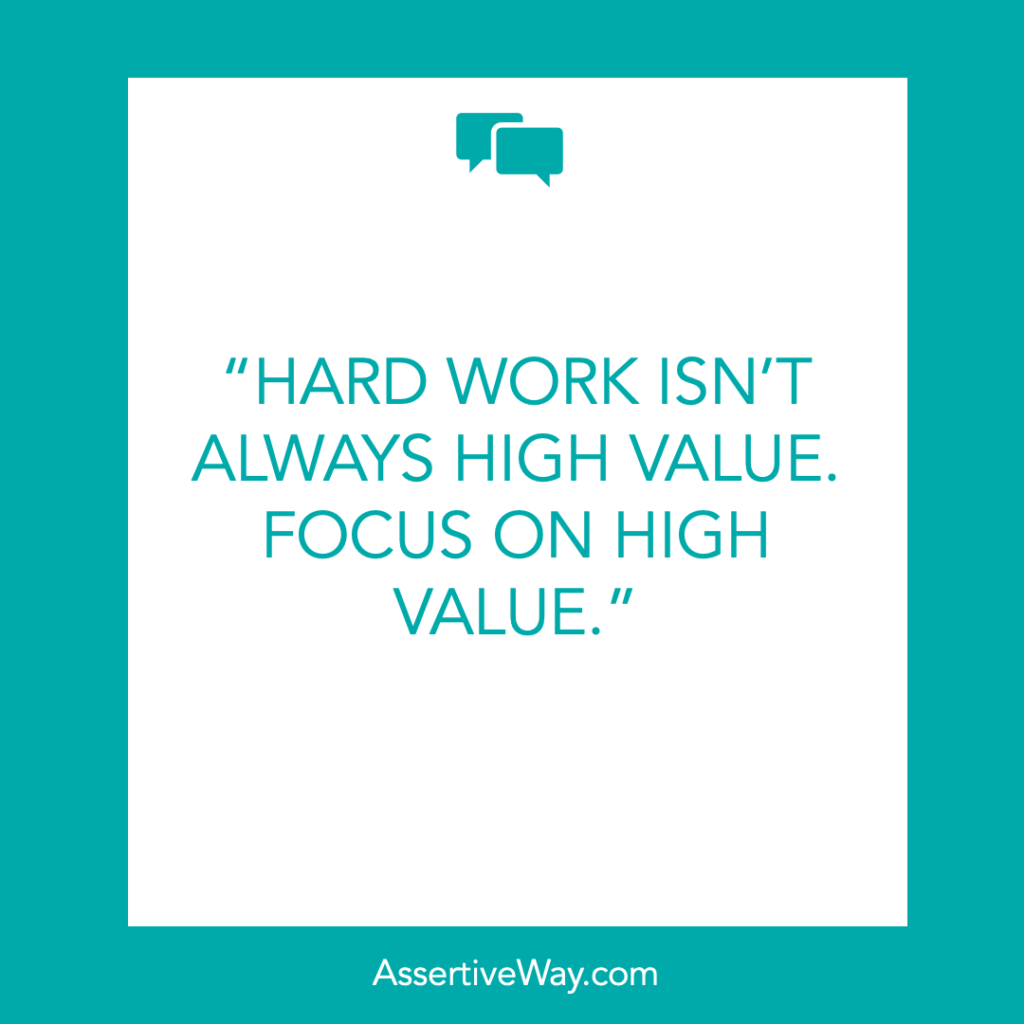


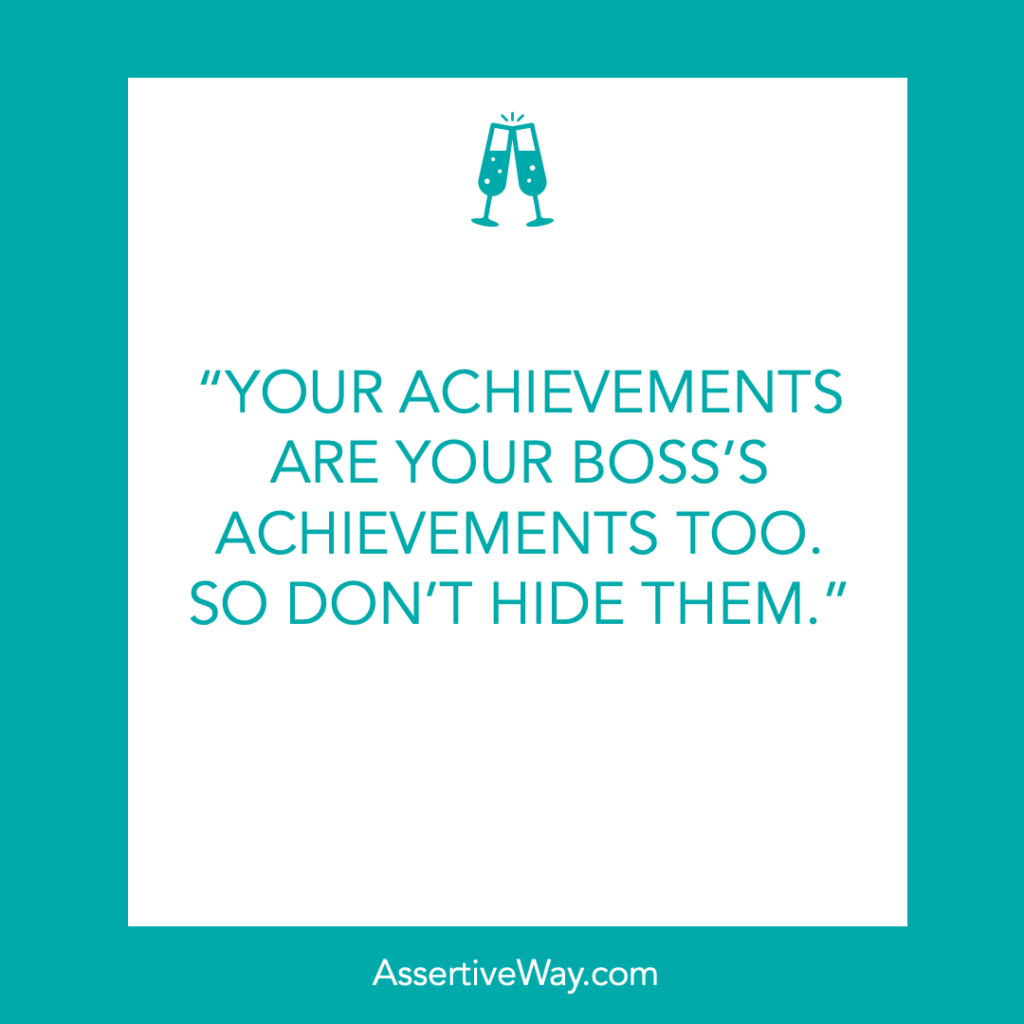
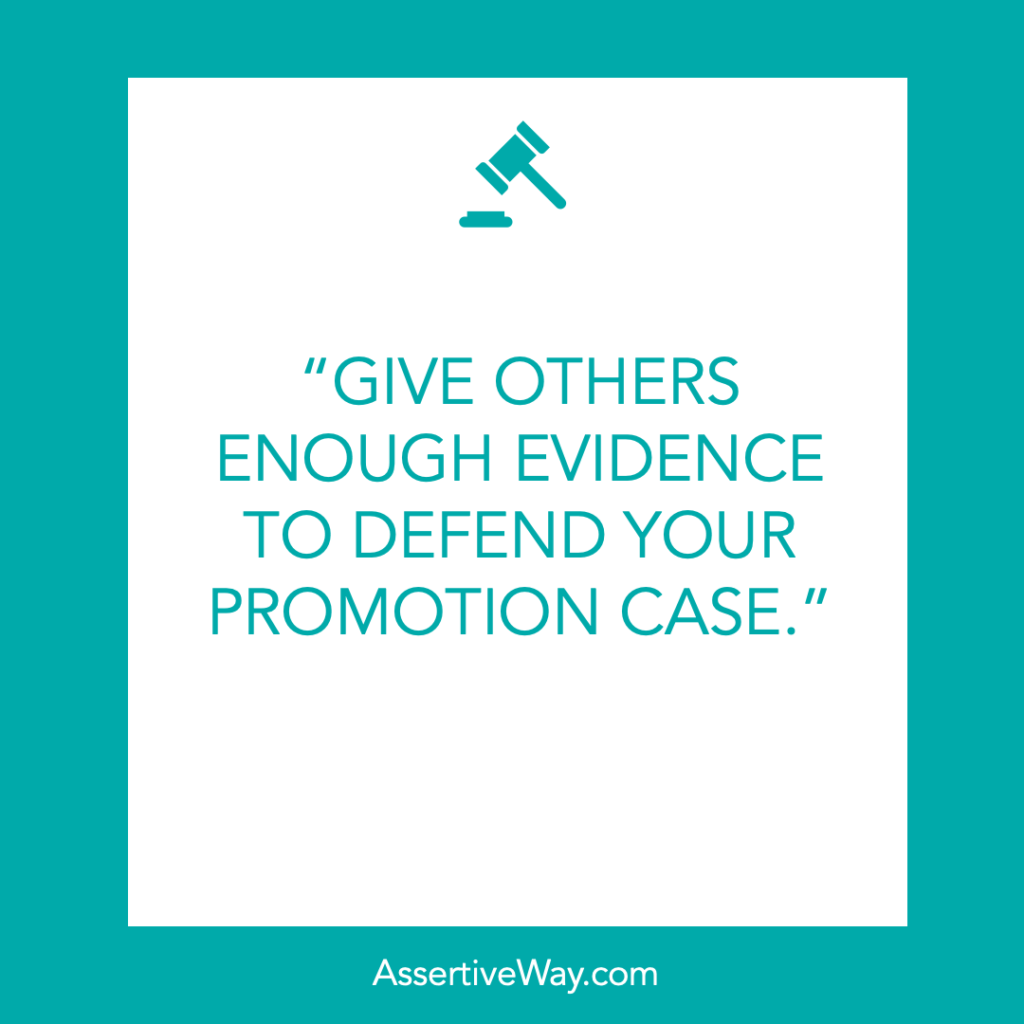

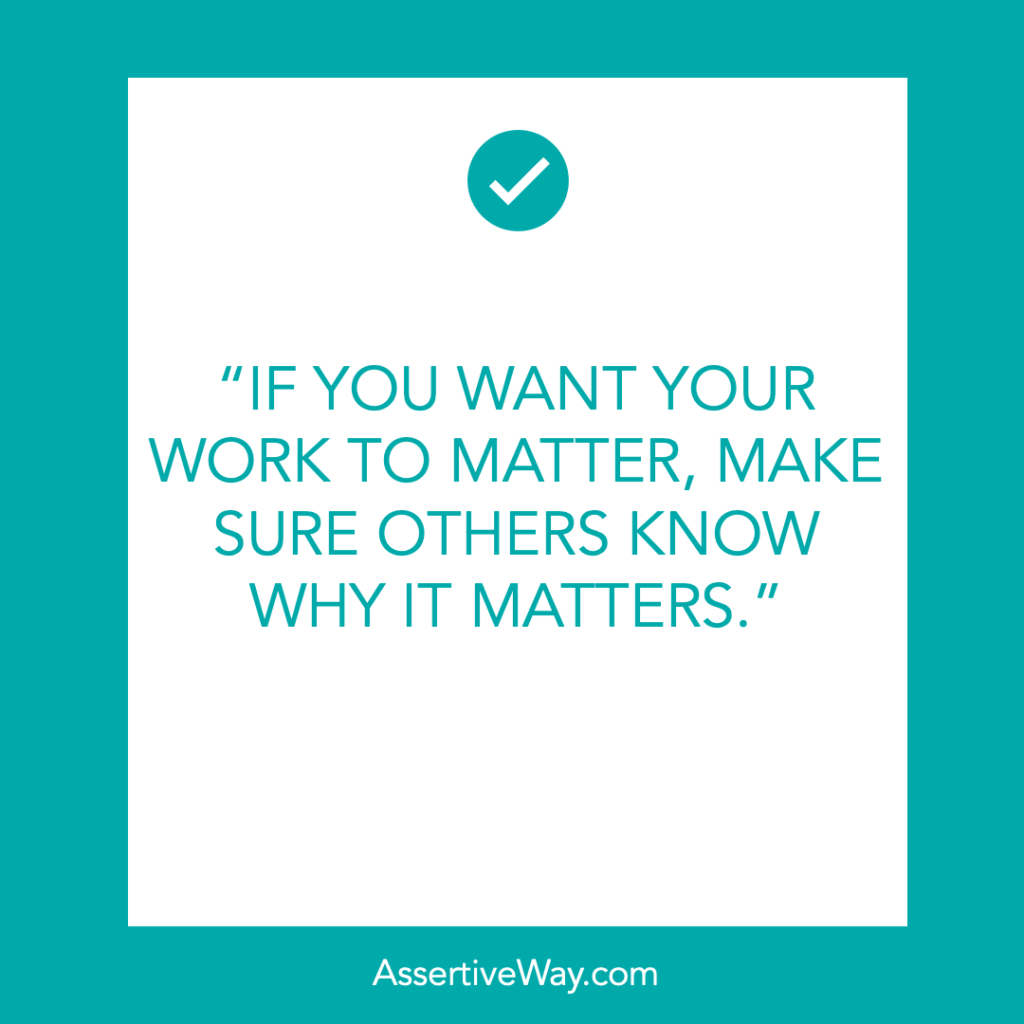


Do you feel uncomfortable self-promoting your work? Which technique are you willing to give a try?